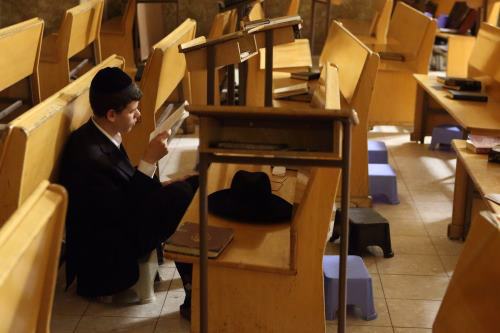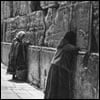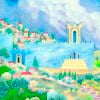The saddest day on the Jewish calendar is the Ninth of Av, “Tisha B’Av.” It is the date when both our Holy Temples were destroyed, and an era of exile, persecution and spiritual blackness began.
Tisha B’Av starts at sundown of the eighth of Av and lasts till the following nightfall—click here for exact times for your location.
On Tisha B’Av we abstain from:
- Eating and drinking. Anyone over bar/bat mitzvah fasts, including pregnant and nursing women. Feeling ill? Consult a rabbi.
- Bathing or washing. Exceptions: soiled hands, upon exiting the restroom, and the morning ritual handwashing (only the fingers).
- Applying lotions or creams.
- Wearing shoes that contain leather.
- Marital relations.
- Regular Torah study. We study only about the Temples’ destruction or other sad topics. (This injunction begins at noon on the eve of Tisha B’Av.)
Nothing should distract from the mourningDon’t greet a friend with “hi” or “good morning.” Don’t go on strolls or outings, and if possible, take the day off work—nothing should distract from the mourning. Until midday, we sit only on the floor or a low stool.
Leading up to Tisha B’Av:
Eat the final meal shortly before sunset. A meager meal, it includes a boiled egg, a traditional symbol of mourning, and a piece of bread dipped in ashes. Eat the meal while seated on the floor or a low stool. (Tip: Have a full meal earlier on, in preparation for the fast.)
Tisha B’Av Night:
Finish eating by sunset. The lights are dimmed in the synagogue and the Ark’s curtain is removed. The book of Lamentations is read after the evening prayers.
Day:
No tallit or tefillin for the morning prayers. After the prayers we recite kinot (elegies). We don the tallit and tefillin for the afternoon prayers.
After nightfall, before breaking the fast, we ritually wash our hands to make up for the morning's truncated washing.
From the ashes of the destroyed Temple will rise an incomparably magnificent edifice. Exile will give birth to redemption. It is a tradition that our redeemer will be born on Tisha B’Av. It is a day of anticipation and hope, for “One who mourns Jerusalem will merit seeing her happiness.”
Notes: If the ninth of Av falls on Shabbat, the fast is postponed one day, and begins on Saturday night. Click here for special instructions for when Tisha B’Av is observed on Sunday.






Join the Discussion